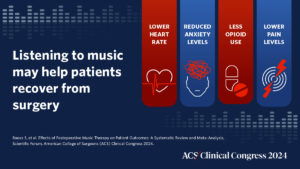Scientists reviewing the findings from over 3,000 studies say they have uncovered a surprising correlation between patients listening to music and recovery rates from surgery. Led by researchers from the American College of Surgeons, the new meta-analysis found evidence linking music to reduced feelings of anxiety, less opioid use, reduced pain, lowered cortisol levels, and a lower heart rate, resulting in faster recovery times, especially after surgery.
According to the study authors, the improvements in recovery from music can begin as soon as a patient wakes up from surgery.
“When patients wake up after surgery, sometimes they feel really scared and don’t know where they are,” explained Dr. Eldo Frezza, the study’s senior author and a professor of surgery at California Northstate University College of Medicine. “Music can help ease the transition from the waking up stage to a return to normalcy and may help reduce stress around that transition.”
Statistically Significant Pain Reduction When Listening to Music After Surgery
To determine the role listening to music may play in surgery recovery, the team analyzed 3,736 previous research papers dealing with surgery and its outcomes. The team narrowed this list to 35 published studies in which researchers recorded the necessary measures regarding pain, anxiety, and other aspects of recovery.
One of the most prevalent themes in these previous studies was a reported reduction in pain, especially right after the surgery. These self-reported reductions in pain were statistically significant on the day of the surgery and throughout the recovery process.


According to the study authors, this result was confirmed by two validated measures of pain severity where patients are asked to self-report their overall pain experience. The Visual Analogue Scale showed a 7% pain reduction, while the Numeric Rating Scale showed a 19% reduction. Although both measures are subjective, the researchers say that simply believing one is in less pain provides value to recovery.
“Although we can’t specifically say they’re in less pain, the studies revealed that patients perceive they are in less pain, and we think that is just as important,” said Shehzaib Raees, first author of the study and a third-year medical student at the California Northstate University College of Medicine.
Notably, this perceived reduction in pain translated to a significant drop in opioid use after surgery. According to the study authors, patients who listened to music on the first day after surgery used roughly half the morphine (an average of 0.758 mg) compared to patients who did not listen to music (a 1.654 mg average).
Reduced Anxiety, Cortisol Levels, and Heart Rate
Along with the reductions in pain, subjects who listened to music after surgery also showed several other beneficial health outcomes. For example, the State-Trait Anxiety Inventory, which measures anxiety levels, showed those feelings were reduced by an average of 3% across all patients.
The team also found a notable reduction in heart rate for patients who listened to music after surgery. On average, 4.5 fewer heartbeats per minute were measured, which is statistically significant as the average heart rate varies between 50 and 100 beats per minute.
According to the study authors, a healthy heart rate can significantly improve surgery recovery due to the improved circulation of nutrients and oxygen, especially in the areas that were operated on. They also note that a heart rate above 100 can lead to tachycardia and atrial fibrillation, both of which can cause serious health complications, especially in patients undergoing recovery.
Finally, the researchers found that the blood cortisol levels of surgery patients who listened to music were lower than those of those who did not. Cortisol, a stress hormone, can contribute to swelling and inflammation, potentially prolonging recovery after surgery.
Music Type Doesn’t Matter
In the study’s conclusion, the researchers note that music can work as a passive recovery tool, as opposed to things like yoga or meditation, which require considerable focus or movement. This is especially significant when the surgery limits the patient’s ability to move or focus for long periods.
“When listening to music, you can disassociate and relax,” said Raees. “In that way, there’s not much you have to do or focus on, and you can calm yourself down.”
The researchers point out that certain variables, such as how long patients listened to music, were not controlled for in their research. However, they found that all types of music had a similar effect and that patients who hope to benefit from this research should listen to the music they like.
“We’re not trying to say that one type of music is better than another,” he said. “We think music can help people in different ways after surgery because music can be comforting and make you feel like you’re in a familiar place.”
The authors presented their study, “Effects of Postoperative Music Therapy on Patient Outcomes: A Systematic Review and Meta-Analysis,” at the American College of Surgeons (ACS) Clinical Congress 2024 in San Francisco, California.
Christopher Plain is a Science Fiction and Fantasy novelist and Head Science Writer at The Debrief. Follow and connect with him on X, learn about his books at plainfiction.com, or email him directly at christopher@thedebrief.org.

